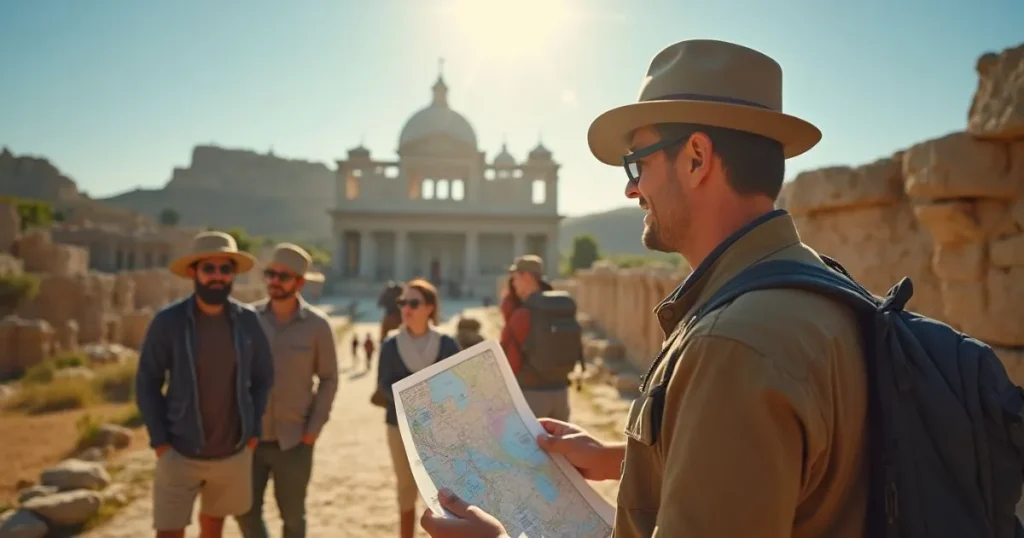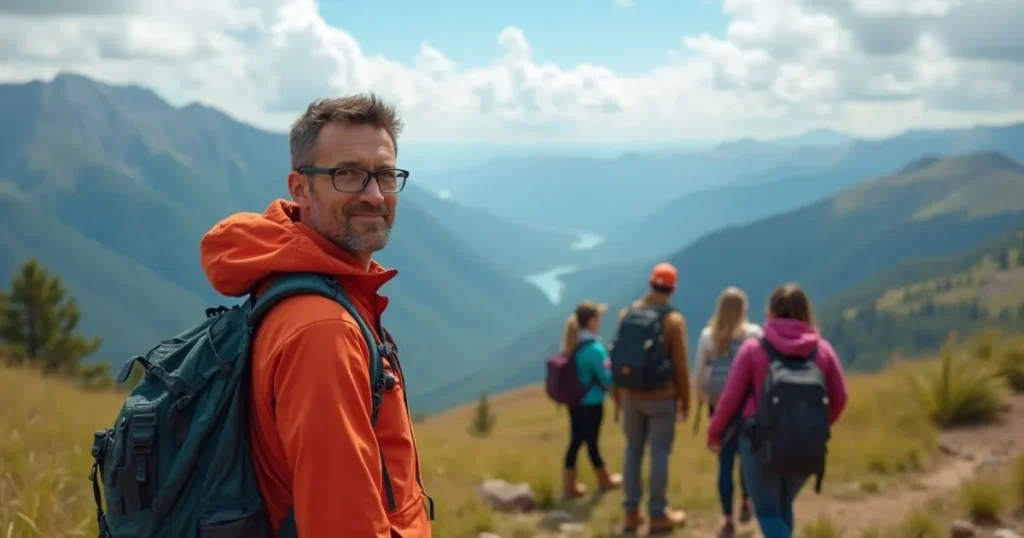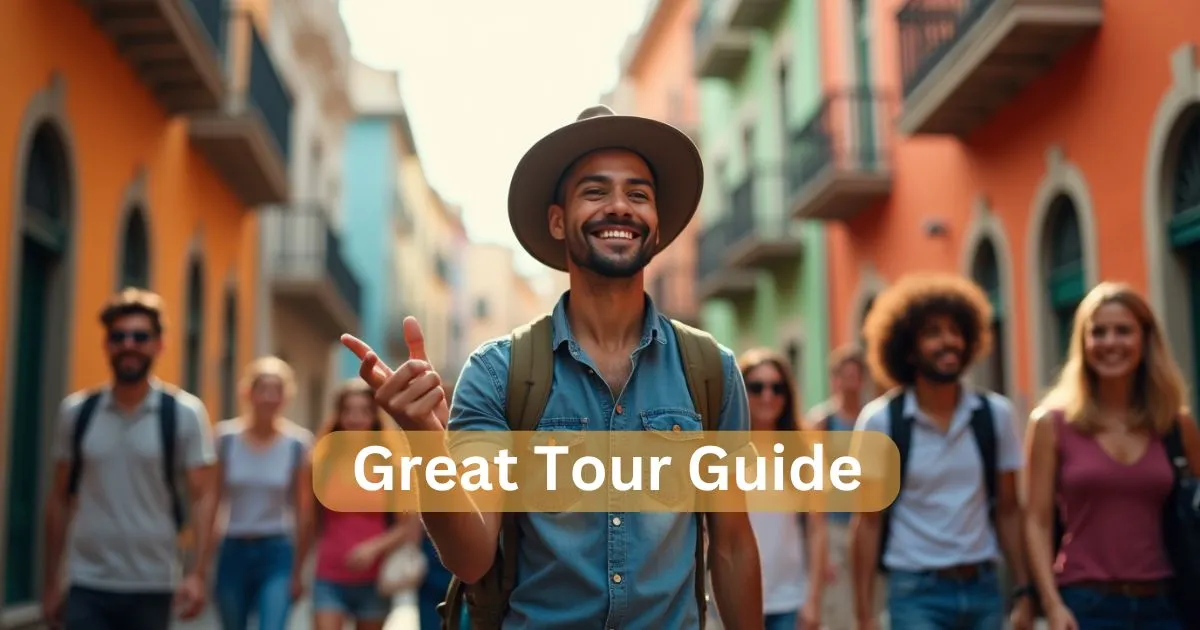“I would have walked right past it,” Sarah confessed, sipping her coffee in a hidden café tucked behind an unassuming doorway in Barcelona’s Gothic Quarter. “Our tour guide Miguel not only showed us this local gem but introduced us to the owner who shared stories about the building’s 200-year history as a former apothecary.” What began as a standard European vacation transformed into an unforgettable journey of discovery—all thanks to a remarkable tour guide who knew exactly where to go and when.
A great tour guide can profoundly impact the quality of your travel experience, going well beyond simply pointing out landmarks or reciting memorized facts. They become the bridge between you and the destination, unlocking doors to experiences that would otherwise remain closed to the average tourist.
The benefits of having a knowledgeable local guide are numerous: they offer deeper cultural understanding, access to unique experiences, and can save you countless hours of research and planning. Whether you’re exploring ancient ruins, navigating bustling markets, or seeking authentic local cuisine, the right tour guide can transform your trip from ordinary to extraordinary.
Table of Contents
Why a Great Tour Guide Makes All the Difference
Deeper Cultural Immersion
“Travel is about stories—not just seeing places, but understanding them,” explains veteran tour guide and travel writer James Hoffman. This sentiment perfectly captures why tour guides are invaluable for cultural immersion. While guidebooks provide facts and figures, tour guides provide context, history, and insights that bring a destination to life.
A local tour guide can illuminate cultural nuances and traditions that might otherwise go unnoticed. For instance, they might explain why locals in Spain eat dinner at 10 PM, or the historical significance behind a seemingly ordinary street corner in Paris. These cultural details aren’t just interesting tidbits—they’re the difference between observing a culture and genuinely experiencing it.
Understanding local customs and etiquette is another invaluable benefit. Your guide can advise you on appropriate temple attire in Thailand, tipping practices in Mexico, or dining etiquette in Japan—preventing awkward cultural faux pas and helping you connect more authentically with the places you visit.
Access to Hidden Gems & Local Secrets
Perhaps the most compelling reason to hire a tour guide is their ability to take you beyond tourist traps and into the authentic heart of a destination. While millions of visitors crowd around the same landmarks each year, your guide can lead you to extraordinary experiences just around the corner from the masses.
Consider Rome, where tourists cluster around the Colosseum and Trevi Fountain. A knowledgeable local tour guide might take you to Quartiere Coppedè, a fairytale-like neighborhood of whimsical architecture, or to a family-run trattoria where grandmothers still make pasta by hand each morning—places that rarely appear in guidebooks but represent the true essence of the city.
This insider knowledge extends to optimal timing as well. Your guide knows exactly when to visit popular attractions to avoid crowds, which local festivals are worth attending, and where to find the best sunset views that haven’t yet been discovered by Instagram influencers.

Personalized Experiences
“The difference between a good vacation and an unforgettable journey often comes down to personalization. A private tour guide can craft experiences specifically tailored to your interests, creating memories that resonate deeply.” – International Travel Magazine
Private or small-group tours offer a level of customization impossible with large tour groups. A history buff visiting Athens might benefit from a guide specializing in ancient Greek civilization, while a culinary enthusiast in Bangkok would appreciate a guide who can navigate the city’s street food scene and explain ingredients and cooking techniques.
Specialized tours have exploded in popularity in recent years, with options catering to nearly every interest:
- Food tours: Sampling local delicacies with explanations about ingredients and cultural significance
- Photography tours: Visiting the most photogenic locations at optimal lighting times
- Historical tours: Deep dives into specific periods or events that shaped a destination
- Adventure tours: Exploring natural landscapes with guides who prioritize safety and environmental knowledge
- Art tours: Gaining expert insights into museums, galleries, and street art
The value of having a guide who can answer your specific questions cannot be overstated. Unlike generic recorded audio guides or large group tours where questions go unanswered, a private tour guide creates space for curiosity and learning tailored to your interests.
Time Savings & Stress Reduction
Travel should be enjoyable, not exhausting. Yet many travelers spend hours researching destinations, planning routes, navigating public transportation, and standing in endless lines—often to discover that the attraction is closed for renovation or that they’ve wandered into a tourist trap.
Tour guides eliminate these common frustrations. They know the most efficient routes between attractions, when to visit to avoid crowds, and often have special access to skip long entrance lines. In cities with challenging public transportation or where language barriers exist, a guide can save you hours of confusion and frustration.
Consider Venice, with its labyrinthine canals and alleyways where even Google Maps struggles. A local guide navigates effortlessly while sharing stories about the buildings you pass, maximizing your limited time in this unique city. Or imagine trying to navigate the chaotic medinas of Marrakech alone, versus having a guide who knows every twist and turn while keeping persistent vendors at bay.
This peace of mind extends to all aspects of your trip—from restaurant recommendations to handling unexpected closures by pivoting to equally rewarding alternatives. You’re free to be present and enjoy your surroundings rather than constantly consulting maps and timetables.
Enhanced Safety and Security
Traveling in unfamiliar environments can present safety challenges that even experienced travelers might overlook. Tour guides provide an additional layer of security by offering valuable safety tips specific to the destination.
Your guide can advise which neighborhoods to avoid after dark, warn about common scams targeting tourists, and suggest secure transportation options. For instance, a tour guide in Rio de Janeiro might recommend specific beaches and times of day that are safest for visitors, or a guide in Bali might advise on avoiding certain areas during religious ceremonies.
Language barriers can become particularly problematic during emergencies. Having a guide who speaks the local language means they can assist with everything from minor issues (like ordering food with dietary restrictions) to major emergencies (such as communicating with medical professionals or police).

How a Bad Tour Guide Can Ruin Your Trip
While a great tour guide enhances your travel experience, a bad one can have the opposite effect. Being aware of potential pitfalls helps you make better choices when selecting your guide.
Inaccurate Information or Lack of Knowledge
“Our guide in Egypt kept mixing up pharaohs and dynasties, confusing basic historical facts that I knew from high school,” recounts traveler Michael Chen. “It undermined trust in everything else he told us.”
Misinformation isn’t just disappointing—it robs you of genuine understanding and appreciation for a destination. Some unscrupulous operators hire guides with minimal training or knowledge, relying on memorized scripts rather than genuine expertise.
When researching potential tour guides, look for those with relevant educational backgrounds, official certifications, or extensive personal experience with the subject matter. A guide specializing in architectural tours should understand architectural history and terminology, while a wildlife guide should demonstrate knowledge of local ecosystems and animal behavior.
Poor Communication Skills
Even the most knowledgeable guide falls short if they cannot communicate effectively. Communication issues range from language barriers to poor storytelling abilities or difficulty managing group dynamics.
A guide with heavy accent or limited vocabulary in your language might struggle to convey nuanced information, while one who speaks too quickly or quietly might leave you constantly asking for repetition. Equally problematic are guides who monopolize conversations, lecture rather than engage, or fail to read the group’s interest level and adjust accordingly.
Great tour guides are excellent communicators who adapt their style to their audience, check for understanding, and create an interactive experience rather than a one-sided information dump.
Lack of Enthusiasm or Passion
Few things deflate a tour faster than a guide who clearly views their job as routine drudgery rather than a passion. Enthusiasm is contagious—when a guide genuinely loves their subject matter, their excitement naturally transfers to the group.
“You can tell within five minutes whether a guide is going through the motions or truly passionate about sharing their city,” notes veteran traveler Elena Gonzalez. “The passionate ones transform even ordinary street corners into fascinating stops with their energy and storytelling.”
Guides who display genuine curiosity, continue their own education about their subjects, and share personal connections to the material typically provide the most memorable experiences. Their authentic passion makes even routine information feel fresh and engaging.
Focusing Only on Tourist Traps
Many subpar guides follow cookie-cutter itineraries focused exclusively on overcrowded, overpriced tourist attractions—often because they receive commissions from shops, restaurants, or venues.
The hallmarks of this problem include rushed visits to major attractions followed by extended “shopping opportunities” at establishments clearly catering to tourists. You might notice inflated prices, pressure to make purchases, or an unwillingness to deviate from the standard route even when better alternatives exist nearby.
Exceptional guides balance must-see attractions with authentic local experiences, willingly share insider recommendations without commission incentives, and adapt itineraries based on group interests rather than potential kickbacks.
Disregard for Ethical and Sustainable Practices
Responsible tourism has become increasingly important as travelers recognize their environmental and social impact. Guides who disregard ethical considerations—encouraging wildlife harassment for photos, promoting businesses with exploitative labor practices, or disrespecting local customs—contribute to tourism’s negative effects.
Examples include elephant rides in Thailand (despite documented animal cruelty), recommending restaurants that serve endangered species, or encouraging behaviors that local communities find disrespectful. Ethical guides prioritize environmental sustainability, support locally-owned businesses, and model respectful cultural engagement.
Tips for Finding a Great Tour Guide
Finding the perfect tour guide requires research and consideration, but the effort pays dividends in the quality of your travel experience. Here’s how to identify guides who will enhance your journey:

Research Online Reviews and Ratings
| Platform | Strengths | What to Look For |
|---|---|---|
| TripAdvisor | Vast number of reviews, photos from actual tours | Consistent positive feedback, responses to negative reviews |
| Viator | Verified booking reviews, clear cancellation policies | Detailed reviews mentioning guide by name |
| GetYourGuide | User-friendly interface, quality control standards | High ratings across multiple review categories |
| Airbnb Experiences | Unique, locally-hosted activities | Personal stories about guide interactions |
| Google Reviews | Unfiltered perspectives, local tour companies | Recent reviews indicating current service quality |
When reading reviews, look beyond star ratings to identify patterns in feedback. Does the guide consistently receive praise for knowledge, communication skills, and flexibility? How do they respond to criticism? A defensive attitude toward negative reviews might indicate poor customer service.
Pay particular attention to reviews from travelers who share your interests or travel style. A guide perfect for history buffs might not suit families with young children, while a guide praised for energetic, fast-paced tours might overwhelm seniors or those with mobility issues.
Ask for Recommendations
Personal recommendations often lead to the most satisfying guide experiences. Reach out to friends or family members who have visited your destination, particularly those with similar travel preferences. Their firsthand experiences can provide insights not available through online research.
Travel communities like Facebook groups, forums like Lonely Planet’s Thorn Tree, or platforms like Reddit’s travel subreddits offer access to recent traveler experiences. A simple post asking for guide recommendations often yields helpful suggestions from people who have visited recently.
Don’t overlook local resources. Contact your hotel’s concierge service, local tourism boards, or destination management companies for referrals. While some may receive commissions for recommendations, many prioritize guest satisfaction and maintain relationships with high-quality guides.
Check Credentials and Experience
Legitimate professional tour guides typically hold credentials that demonstrate their expertise and commitment to professional standards. These might include:
- Government-issued tour guide licenses (required in many countries)
- Certifications from tourism associations or guide guilds
- Specialized training in areas like wilderness first aid, art history, or archaeology
- Academic degrees in relevant fields like history, anthropology, or hospitality
Beyond formal credentials, experience matters tremendously. Inquire about how long the guide has been working in the region and with what types of travelers. A guide who has conducted tours for decades likely possesses depth of knowledge that newer guides are still developing.
For specialized tours, verify that the guide has specific expertise in your area of interest. A general city guide might not have the deep knowledge necessary for an in-depth architectural tour, while a nature guide should demonstrate specific training in local ecosystems and wildlife behavior.
Consider Your Interests and Preferences
The “best” tour guide varies dramatically depending on your interests, travel style, and needs. A family with young children requires different qualities than a solo academic researcher or a group of adventure-seeking friends.
Before booking, clarify:
- Group size preference: Private, small group, or larger tours each offer different advantages in terms of personalization, social interaction, and cost.
- Pace and physical requirements: Some guides specialize in leisurely, accessible experiences while others lead fast-paced, physically demanding adventures.
- Special interests: Whether you’re passionate about architecture, cuisine, wildlife, or photography, guides with matching specializations will enhance your experience.
- Language needs: Beyond basic communication, consider whether nuanced discussion is important to your experience.
Many tour guides offer customizable experiences or specialize in particular niches. A food tour guide in Bangkok might focus exclusively on street food, while another specializes in high-end Thai cuisine—both excellent options for different travelers.
Communicate Your Expectations
Clear communication before booking helps ensure alignment between your expectations and what the guide provides. Reach out with specific questions about:
- Itinerary flexibility and willingness to accommodate special requests
- Typical tour pacing and breaks
- Inclusion of meals, transportation, or entrance fees
- Photography opportunities and time allowances
- Accommodation of dietary restrictions or mobility limitations
Be forthright about your budget constraints as well. A good guide can often suggest modifications to make an experience more affordable without sacrificing quality, such as sharing transportation costs with other travelers or focusing on free or low-cost attractions.
Discuss your learning style and interests so the guide can tailor their approach. Some travelers prefer deep historical context, while others enjoy personal anecdotes and contemporary culture. Communicating these preferences helps your guide customize their presentation to your interests.
Conclusion
A great tour guide transforms ordinary tourism into extraordinary travel experiences. They serve as cultural translators, efficiency experts, and storytellers who breathe life into destinations. Whether unveiling hidden local treasures, providing crucial historical context, or simply smoothing logistical challenges, the right guide elevates your journey from mere sightseeing to genuine connection and understanding.
As travel writer Pico Iyer observed, “We travel, initially, to lose ourselves; and we travel, next, to find ourselves.” A skilled tour guide facilitates both journeys—helping you step outside your everyday perspective while simultaneously deepening your understanding of both the destination and yourself in relation to it.
For your next adventure, invest time in finding a guide whose knowledge, communication style, and interests align with yours. The relationship might last only hours or days, but the memories and insights they help create will endure long after you return home—becoming not just souvenirs, but transformative elements of how you understand the world.
Ready to find your perfect guide? Start researching options for your next destination today, and prepare to experience travel through the eyes of someone who calls your destination home.


I wrote this post because I genuinely believe a great tour guide can turn a good trip into an unforgettable adventure. Some of my best travel memories came from unexpected stories and hidden spots I would have never discovered on my own. If you’ve ever had a moment like that, I’d really love to hear your story in the comments.